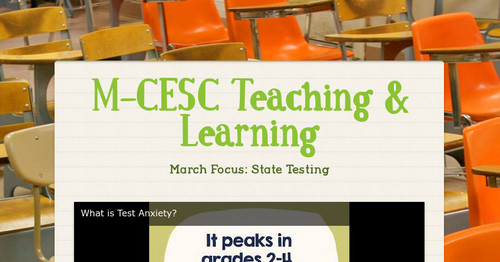
MCCESC Teaching & Learning
April: Being Evaluated through OTES 2.0
Why the shift?
According to the Ohio Department of Education (2020), "the State Board of Education values the importance of promoting educator professional growth that leads to improved instructional performance and student learning. OTES 2.0 is a professional growth model and is intended to be used to continually assist educators in enhancing teacher performance. An effective professional growth model considers a teacher’s instructional strengths, while supporting identified areas for improvement according to the profile of each educator. This process is to be collaborative, ongoing and supportive of the professional growth of the teacher."
The Madison-Champaign ESC has 4 state-trained trainers who have conducted multiple training sessions for administrators. We have also created teacher training modules for districts, as well as presented strategies to assist teachers in meeting the expectations of a "SKILLED" educator.
If you have any questions or need assistance, please contact us at tandlsupport@mccesc.org.
The rubric
Domain 1: Focus for Learning
- Analyze trends & patterns in data - consider having data conversations with colleagues. Here's a brief video of a data conversation.
- Have students set academic goals. Here's a NWEA article about setting strategic and tactical goals.
Connections to Prior & Future Learning:
- Include relevance in your lessons - "What does today's lesson have to do with my life?"
Connections to State Standards & District Priorities:
- Utilize released test items to create assessments
- Sign-up for ODE Updates
- Nominate yourself for assessment committees
- Join state & national organizations
Domain 2: Knowledge of Students
- Look at prior data (state test scores, grades, other testing)
- Talk with professionals (teachers, interventionists, counselors, psychologists, related services)
- Administer parent surveys to gauge academic ability, interests and cultural experiences.
- Use pre-assessment data to gather information regarding student understanding.
- Ask for students to complete interest surveys and/or learning style inventories.
DOMAIN 3: LESSON DELIVERY
- Incorporate questioning techniques to encourage high-level thinking of students. Consider utilizing StartSOLE as an instructional strategies.
- Communicate learning goals with students
Monitoring Student Understanding:
- Diagnose your students' thinking. This article provides a number of strategies to assist in this component.
Student-Centered Learning:
- Universal Design for Learning - Make learning accessible and challenging for all students, while supporting the various needs of individual students.
- Playlists
- Checklists
- Choice Boards
- Grid Method
DOMAIN 4: CLASSROOM ENVIRONMENT
- Involve students in making the rules and norms
- Make the number of rules short and easy to understand
- Phrase the rules in a positive way
- Post the rules
Classroom Climate & Cultural Competency:
- Addressing the social-emotional needs of students by using journal prompts, brain breaks, Random Acts of Kindness lessons or other SEL activities.
- Incorporating Positive Behavior Intervention Supports (PBIS) with this lesson plan template.
- Developing caring classrooms through the use of Community Circles.
DOMAIN 5: ASSESSMENT OF STUDENT LEARNING
- Use a variety of formative and summative assessments to gain information on student achievement. This article has a number of different assessments, along with benefits and limitations for each.
- Analyze the data for patterns and trends.
- Create meaningful learning experiences for individual students based upon the data (i.e. differentiate)
Evidence of Student Learning:
- Use two different pieces of High Quality Student Data (HQSD) to show growth on the expected growth and/or achievement.
- Share evidence of learning with students and parents.
domain 6: professional responsibilities
- Keep track with communication logs
- Keep families "in the loop" with the Remind app or newsletters
- Make conferences goal-oriented
- Participate in Building Better Bonds with Families - Website for parents & FREE courses for educators
Communication & Collaboration with Colleagues:
- Improve teacher-based team meetings
- Start & participate in professional learning communities within your building
District Policies & Professional Responsibilities:
- Know the Licensure Code of Professional Conduct for Ohio Educators, and demonstrate by following it.
- Join leadership committees within the district (BLT, DLT, Strategic Planning, etc.)
Professional Learning:
- Set personal, professional goals that align your Professional Growth Plan (PGP) to your Individualized Professional Development Plan (IPDP).
- Take advantage of professional learning opportunities that align to your PGP goals.
- Keep track of professional discourse that you have with colleagues.
March 2020 Focus: State Testing
WE ARE HERE TO HELP
Specialty Areas
OTES 2.0
Utilizing HQSD
StartSOLE
UDL
Individualized Learning (choice boards, playlists, learning menus, etc.)
Classroom Management
Creating Cultures of Care
Building Better Bonds with Families
Reach out - we are here to help. tandlsupport@mccesc.org
Madison-Champaign ESC
We Work to Serve!
Department of Teaching & LearningCheck out our Instagram: @tandlmccesc
Feel free to use our hashtags:
#MCCESCTeachingandLearning #M_C_ESC
Email: tandlsupport@mccesc.org
Website: mccesc.org
Location: 2200 U.S. 68, Urbana, OH, USA
Phone: 937-484-1557
Facebook: https://www.facebook.com/madison.champaign.esc/
Twitter: @M_C_ESC












